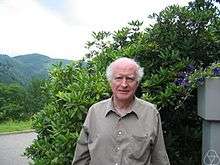John N. Mather
| John Norman Mather | |
|---|---|
 | |
| Born |
June 9, 1942 Los Angeles, California |
| Residence | United States |
| Nationality |
|
| Fields | Mathematics |
| Institutions |
IHES Harvard University Princeton University |
| Alma mater |
Harvard University Princeton University |
| Doctoral advisor | John Milnor |
| Doctoral students |
James Damon Giovanni Forni Vadim Kaloshin Robert May |
| Known for |
Smooth functions Topologically stratified space |
| Notable awards |
John J. Carty Award for the Advancement of Science (1978) National Order of Scientific Merit (Brazil) (2000) George David Birkhoff Prize (2003) |
John Norman Mather (born June 9, 1942 in Los Angeles, California) is a mathematician at Princeton University known for his work on singularity theory and Hamiltonian dynamics. He is descended from Atherton Mather (1663-1734), a cousin of Cotton Mather.[1]
His early work dealt with the stability of smooth mappings between smooth manifolds of dimensions n (for the source manifold N) and p (for the target manifold P). He determined the precise dimensions (n,p) for which smooth mappings are stable with respect to smooth equivalence by diffeomorphisms of the source and target (i.e. infinitely differentiable coordinate changes).
He also proved the conjecture of the French topologist René Thom that under topological equivalence smooth mappings are generically stable: the subset of the space of smooth mappings between two smooth manifolds consisting of the topologically stable mappings is a dense subset in the smooth Whitney topology. His notes on the topic of topological stability are still a standard reference on the topic of topologically stratified spaces.
He is one of the three editors of the PRINCETON MATH series in Annals of Mathematics Studies.
He is a member of the National Academy of Sciences since 1988. He received the John J. Carty Award of the National Academy of Sciences in 1978 (for pure mathematics)[2] and the George David Birkhoff Prize in Applied Mathematics in 2003. He also received the Brazilian Order of Scientific Merit in 2000 and in 2014 the Brouwer Medal from the Royal Dutch Mathematical Society.
See also
References
External links
- Mather notes on Topological Stability (on the Princeton University website, pdf file)
- John Mather bibliography on the Princeton University website (pdf file)
- John N. Mather at the Mathematics Genealogy Project